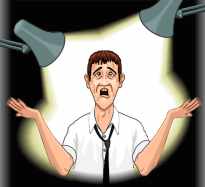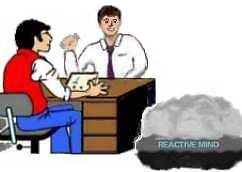| Ethics Dictionary | Conditions Formulas | PTS Glossary | FAQs |
|
| Ethics Dictionary | Conditions Formulas | PTS Glossary | FAQs | |
Note: This chapter is from 'The Road to Clear", Level 2.
Ethics and Confessional Auditing
Note: This chapter is a commented version of the Confessional Auditors Beingness of ST-2. Ideally an Ethics Officer is trained as an ST-2 auditor. If not an auditor, he still needs to know this much about confessional auditing. This chapter helps him understand and confront evil and deal with it correctly. An Ethics Officer is not bound by the Auditors Code. He can form an opinion and insist upon a change of behavior in the person using disciplinary means. An auditor would never do that. His approach under the Auditors Code is very different. The auditor assumes the person's Ethics is in to a point where the auditor can expect the pc's full cooperation and thus allow the technology to do its job. If the pc's Ethics is out, however, the tech won't be fully effective. The pc won't be in-session, which is defined as 'pc interested in his case and willing to talk to the auditor'. Pc may be in a games-condition with what the auditor is trying to do. He may have things he won't give up, whether withholds, non-survival- or anti-social-behavior. He may be so distracted by real life situations that auditing is the wrong approach. In auditor terms it would be a Present Time Problem of considerable magnitude.
There still have to exist a trust between the person and the Ethics Officer as long as we talk Ethics rather than law enforcement or justice action. The 'Ethics Officer's Trust was in the chapter 'Ethics and Auditing' expressed as:
"Even though the tools are different the basic equation the Ethics Officer operates on is very similar to Auditors Trust. Auditors Trust says, "Auditor plus pc is greater than pc's Bank". The skilled Ethics officer works with and appeals to the basic good self of the person in front of him. He uses enough authority and pressure aimed at the Bank to get the person to straighten out and turn things around. So we have:
The pc's built-in sense of Ethics plus the Ethics officer's authority is greater than the pc's Bank and bad habits.
The pc's built-in sense of Ethics plus the Ethics
officer's authority is greater than the pc's Bank.
The Confessional Auditors Beingness
The job of a Confessional auditor is to find overts and withholds in order to relieve the pc from the burden they represent. To the new auditor Confessional auditing may seem scary and confusing to do. Am I a priest? A detective? A police man or an interrogator? You could probably add many more professions to this list.
To get to the truth, to 'get to the bottom of
things' through tough questioning and other means is indeed an age old activity
plagued with many abusive practices.
In a sense you are a little bit of all four of the professions above. But
confessional auditing is first and foremost its own - it is auditing. It may
awake all kinds of ideas and possible valences in the new auditor. To be able to
do it right you need to sort this out.
The main thing that flies into the new auditor's face are 'earlier practices'. Earlier practices, such as psycho-analysis and the Catholic Church's confession were also discussed in 'Auditors Beingness' of ST-0.
Here is a list and brief description of some 'earlier practices' - not necessary practices to help the individual, but all done in the 'quest for truth'.
The Religious Confession. In the Catholic Church you confess your sins to a priest in the confession box. This is done to help the sinner come clean and get forgiveness from Jesus. "Confess your sins, and Jesus Christ will forgive you." This seems to have good workability.
Some Christian practices arrange meetings where one member is on stage, confessing to the group. This is less workable as it often becomes an act. The sinner may withhold some things and embellish others, which are both working against As-ising of incidents; but the general practice does help the members to confront sin.
Alcoholic Anonymous uses a similar technique to help alcoholics. Since it stays on the subject of substance abuse, it probably has some workability and minimal risks. Also the members get a handle on confronting alcoholism and substance abuse.
Psycho-analysis. There are many schools of psycho-analysis, but the classic form was to make the patient go on and on. Q and A, as in free association, reduces its workability. Since 20% of any group will improve just by having their difficulties addressed, it had some workability, probably above the 20%. The problem was overrunning the patients, mainly discussing motivators and not getting the withholds. Q and A (free association) was used as the method to open a case. Thus missed withholds were left all over the place - with following upsets and even suicide as a result. This nullified any professional claims the practitioners could make as a group.
Psychiatry. Since psychiatry is a branch of medicine they see any behavior outside the 'normal' as a medical problem of the brain. Mental problems are described as a chemical imbalance of the brain. Their 'successes' consist of pacifying or subduing a patient with drugs at this time. When the patient is sitting quiet in a corner in a drugged state he is 'cured'. They are not interested in the patient's case or story. They deny his spiritual nature. Any results or ill effects from confessionals are 'unscientific'.
They also, as a group, developed and administered 'truth-serum', which is a drug, that makes subjects unable to withhold, but using sedation plays right into the Bank and no As-ising or improvements are taking place.
Psychology. At this time it is a mix of many schools, including the two above. Results depend upon the practitioner, not the subject. You find some caring individuals practicing with good sense and judgment with some success and some to the harm of their patients. They completely lack a workable professional code and TRs.
Justice and Military Use. Here we have a number of practices, which are done to get information. They later punish or dispose of the individual. These practices have no therapeutic intent or pretense. They are done to protect society, or as in the military, one's own forces.
Police in some totalitarian countries use torture, drugs, sleep deprivation, food and drink deprivation to get suspects to 'cooperate'. They use electric chock, beatings and other means to inflict pain. The idea is of course, that at some point the suspect will break down and 'tell all' or 'come clean' rather than be subject to more pain. They also use threats of harming loved ones if the prisoner does not 'cooperate'. Other methods of blackmail are also applied. Similar methods are being used by armies in times of war. No wonder both pc's and auditors can find the confessional situation restimulative at times, if things get rough.
Historical Examples
The Spanish Inquisition and other witch hunters also used cruel methods. They
used torture like putting boiling eggs under the victims arm pits; they would
place the victim's body in a device that would stretch it to a point where it
almost came apart. They would use red hot irons to inflict pain. It was
impossible to prove innocence. They would take any statement as a proof of
guilt. A stubborn denial was an even surer sign of being 'possessed by the
Devil'.
So you get the idea. The Reactive Bank is full of images of telling the truth equals pain and unconsciousness, danger and even violent death. Demanding the truth on the other side, has it own Chains of inflicting pain, unconsciousness and death.
So what are we actually doing with
confessionals?
How do we stay clear of all the above?
It could be summarized in two words: Confront and As-is
When we talk Confessional and Confront, we talk about the 'confronting of Evil.'
Evil is to Man the toughest thing to confront. Yet - since it is in his Bank - it should be confronted to be As-is'ed. If not, you give it power and it will continue to be at work and eventually take over.
 |
Evil has an appeal to us. |
How evil can take over was explained this way by R. Hubbard in a lecture:
It might interest you how an evil person (suppressive person) becomes one. That's the guy who has enough overts to deserve more pay-back than you can imagine. The guy, who keeps doing things to do others in. He's the villain. Now the reason he got to be a bad boy was by switching valences.
He had a bad boy over there parked in his mind; and he then, in some peculiar way, got into that bad boy's valence. Now he knows what he is - he's a bad boy. Man is basically good but he mocks-up evil valences and then gets inside them and gets stuck in them. He says the other fellow is bad. He keeps saying the other fellow is bad. He works on this character all the time as something not to be. And eventually he has got this very live character all made up in his mind. Then some day he becomes this other fellow. You see, a valence shift or personality shift happens - he becomes the whole, complete package of personality. And there he is. So now he is an evil fellow. He knows how he is supposed to act. He is supposed to act like the other fellow. That's the switch-over. That's how evil comes into being. (Covered in SH Briefing 73, 1966).
So the key to handling evil is to be able to confront it in the first place. The difference between Auditors Beingness and Confessional Auditors Beingness is only in degree. The confessional auditor has to have an excellent ability to confront evil.
That is what went wrong with the guy in the piece above. The person who couldn't confront evil, but only mock it up as something not to be, eventually gave up and became it. He was Not-is'ing, hating and detesting it. He was holding onto this evil personality package in his mind as something not to be; and suddenly it had become so powerful so he became it. It simply took over.
This is how the Reactive Mind 'works'. It warns you against danger on a stimulus-response level and you don't want to look at those terrible things. Suddenly it has become so powerful so you have no choice but living it.
There are of course degrees of this. A complete switch does not happen suddenly, just because of one incident. Long before it happens, the person simply withholds himself. But when you pull overts and withholds you are preventing something like this from happening down the road. You are getting the pc's ability to confront evil up. The 'demons' (evil valences) in his mind will loose power. He will regain power over them and the basic goodness of Man will prevail in his conduct and thinking.
Confessional Auditors Beingness
In Auditors Beingness of Level 0 we got the following definitions:
"Beingness is: The result of having assumed an identity.
Attitude: The opinion one holds or the behavior one expresses toward some person, space, thing or symbol as a result of the concept he has of it.
TRs reflect the auditor's attitude.
What is behind attitude is Certainty and Beingness."
It also stated:
"Before you can assume the beingness of an auditor you must have gotten the
certainty on the materials of processing. You must know your tools of the trade,
the basic data and actions. The most basic skills of an auditor are the TRs and
Meter skills."
All this applies. You simply have to get your confront up on overts and withholds and on evil. It has to be up to a point where no human or inhuman act will surprise you, upset you, tick you off or shut your communication down.
The best way to do this in the context of this course, is to use the included Confessional Form (Joburg) and drill it as an auditing drill on a doll. You have your twin come with hard crime answers and you drill to handle it with perfect TRs. If you encounter problems in that, you may have to go back to TRs, especially TR-0 Bullbait, and be drilled on that to improve your confront of overts and withholds.
Having done that your own confront of evil will have come up and you can now perform Confessional auditing as auditing without getting it mixed up with harmful practices of the past.
When you can pull overts and withholds while maintaining high ARC and perfect communication with the pc, you have got it. It does take courage to be a good confessional auditor.
Some Stable Data
What you can confront, you can handle.
What you Not-is tends to persist. It eventually becomes so powerful so you become it (valence shift).
Confessional Auditing is auditing. It is done for the pc. You make him confront the hardest thing to confront: Evil.
The auditor is bound by the Auditors Code; the Meter is not. This means you pursue and persist on pulling withholds and getting it all until the Meter, the pc and the auditor are all in agreement about, that the question is now clean. According to R. Hubbard, "a good Confessional auditor is marked by his thoroughness, his willingness to pry, his swinish suspicion. He's a believer in the Meter and little else when he is on the trail of a pc's withhold. This does not, however, mean that the auditor should be misemotional or accusative. It means that he sees what he sees. He knows that when his Meter tells him something is there, something is there - and he knows when he's gotten it all."
Confessionals are done under Auditors Code. Especially these points apply:
(15) Do not to mix the processes of ST with other practices except when the preclear is physically ill and only medical means will serve.
You do not mix Confessional Procedure with any of the practices covered above. It is its own and it is ultimately done for the pc.(22) Never use the secrets of a preclear divulged in session for punishment or personal gain.
There is a client/practitioner privilege. The auditor is sworn to secrecy and confidentiality in a similar manner as lawyers, doctors and priests. If this is violated, pc's willingness to speak to the auditor would not exist or be lowered seriously.
All this should be reflected in your beingness. By making the pc understand, how the Auditors Code apply here and by having your own confront of evil handled, having drilled the procedures with lot of special situations, you can now complete the Confessional Auditors Beingness step and put it all together and assume the beingness of a Pro.
 |
 |
|
Wrong way - before the Meter. |
Right way - with a Meter and for the PC. |
Comment: The data regarding how evil comes about and the need to be able to confront it applies very much to an Ethics Officer. The Ethics Officer has to have a good grasp of, that he works with a being who is basically good and usually down deep is as unhappy with the situation as his fellow Man is. The Ethics Officer uses the tools of Ethics to remedy the situation for now. He understands that the Ethics tools have their limitations. They can prevent the pc from dramatizing his out-ethics for a while; their use creates a "window of opportunity". But this window of opportunity is then used to audit the person. The real causes for his dramatizations can be found in his Bank and he can thus put a non-survival lifestyle behind him for good. Thus we have Ethics as: that additional tool needed to get technology in.